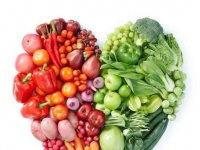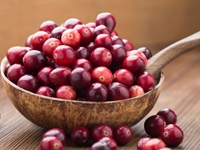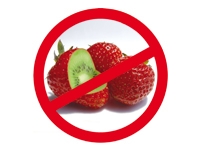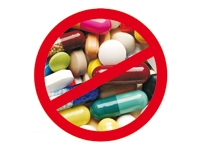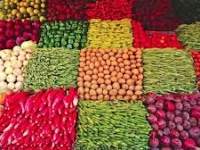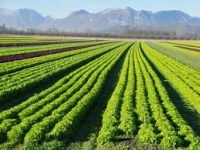-
-
Choose Organic
Organic foods are good for you. They are free of pesticides and chemicals that many conventionally grown foods receive to accelerate their growth cycle.
Eating organic, helps you to get healthy.
Below, we present 10 good reasons that we regard relevant when choosing organic foods, hoping that might help you to make your choices, better informed and conscious of organic food virtues.
By choosing organic:
-
-
1. Avoid Chemicals
Eating organically grown foods is the only way to avoid the cocktail of chemical poisons present in commercially grown food. More than 600 active chemicals are registered for agricultural use in America, to the tune of billions of pounds annually. The average application equates to about 16 pounds of chemical pesticides per person every year. Many of these chemicals were approved by the Environmental Protection Agency (EPA) before extensive diet testing.
The National Academy of Sciences reports that 90% of the chemicals applied to foods have not been tested for long-term health effects before being deemed "safe." Further, the FDA tests only 1% of foods for pesticide residue. The most dangerous and toxic pesticides require special testing methods, which are rarely if ever employed by the FDA.
-
-
2. Benefit from more nutrients
Biologically grown foods have more nutrients, vitamins, minerals, enzymes and micronutrients than conventionally grown food, because the soil is managed and powered with sustainability practices, according to responsible standards. The journal "Alternative and Complementary Medicine" conducted a review of 41 published studies comparing the nutritional value of fruits, vegetables and cereals grown in organically versus conventionally grown fruit. They concluded that there are significantly greater amounts of various nutrients in food from organic farming.
Furthermore, the study confirms that five servings of biologically grown vegetables (such as lettuce, spinach, carrots, potatoes and cabbage) provide an adequate intake of vitamin C. However this does not happen with the same number of servings of conventionally grown vegetables
-
-
3. Enjoy better taste
Try it! The biologically grown foods often taste better because nourished and well balanced soil produces strong and healthy plants. This is especially true with older varieties, which are grown preferring taste over appearance.
-
-
4. Avoid GMO
Genetic Engineering (GE) foods and genetically modified organisms (GMOs) are contaminating our food supply at an alarming rate, with repercussions beyond our comprehension.
GM foods do not have to be labelled as such in the United States, and although in the EU, some GM foods are now required to contain such details, meat, milk and eggs from animals fed with GM feed are, not yet, subject to this labelling.
Once organic foods cannot, in no case, be genetically modified, choosing organic food is the only way to be sure that foods that have been genetically modified, will be out of your diet.
-
-
5. Avoid hormones, antibiotics and drugs in animal products
Conventional meat and dairy are the higher risk foods for contamination by harmful substances. Over 90% of people consume pesticides that are found in meat’s fat tissue and dairy products.
The “EPA. Environmental Protection Agency" reports that the most pesticide consumption comes from meat, poultry , fish , eggs and dairy products because these foods are the most present in the food chain. Cows, chickens and pigs are fed with animal parts , by-products , fish meal and cereals heavily loaded with toxins and chemicals . The animal products with a lower fat content are less dangerous, since toxins and chemicals, are concentrated and accumulated in the adipose tissue.
Antibiotics, drugs and growth hormones are also passed directly through meat and dairy products. UCS (Union of Concerned Scientists) estimates that about 70 % of the antibiotics produced in the United States are administered to animals for non-therapeutic purposes.
A collaborative study done in 2011 by researchers at the University of Jaen in Spain , show the presence of anti- inflammatory drugs, beta-blockers , in the milk ( cow, goat or human), as well as hormones and antibiotics. Cow's milk is that it contains the largest number of molecules.
In 2012, another group of researchers from the University of Almeria, Spain, has gone even further and when analysing jars of food (meat) baby, confirmed the presence of antibiotics for animals, even if in small doses. Antibiotics, such as tilmicosine, or antiparasitic drugs, such as levamisole, are given to livestock in order to avoid illness, but they can remain later in food.
-
-
6. Preserve our ecosystems
Organic farming supports eco-sustenance, or farming in harmony with nature.
Preservation of soil and crop rotation keep farmland healthy, and chemical abstinence preserves the ecosystem. Wildlife, insects, frogs, birds, and soil organisms are able to play their roles in the tapestry of ecology, and we are able to play ours, without interference or compromise.
-
-
7. Reduce pollution and protect water and soil
Agricultural chemicals, pesticides, and fertilizers are contaminating our environment, poisoning our precious water supplies, and destroying the value of fertile farmland. Certified organic standards do not permit the use of toxic chemicals in farming and require responsible management of healthy soil and biodiversity.
According to Cornell entomologist David Pimentel, it is estimated that only 0.1% of applied pesticides reach the target pests. The bulk of pesticides (99.%) is left to impact the environment.
-
-
8. Preserve agricultural diversity
The rampant loss of species occurring today is a major environmental concern. It is estimated that 75% of the genetic diversity of agricultural crops has been lost in the last century. Leaning heavily on one or two varieties of a given food is a formula for devastation. For instance, consider that only a handful of varieties of potatoes dominate the current marketplace, whereas thousands of varieties were once available.
Now, dig back to recent history's potato famine in Ireland, where blight knocked out the whole crop, which consisted of just a few varieties, and millions of people died of starvation. Today, most industrial farms also grow just one crop rather than an array of crops on one piece of land. Ignorance is bliss? Or amnesia is disastrous? Crop rotation is a simple and effective technique used in organic agriculture to reduce the need for pesticides and improve soil fertility.
Most conventional food is also extremely hybridized to produce large, attractive specimens, rather than a variety of indigenous strains that are tolerant to regional conditions such as droughts and pests. Many organic farms grow an assorted range of food, taking natural elements and time-tested tradition into account. Diversity is critical to survival.
-
-
9. Support organic farming directly
Buying organic food is an investment in a profitable future, which encourages the growth of organic farming.
Promotes the emergence of a more diversified product offering, either directly from organic farming, or organic processed products.
-
-
10. Keep our children and future safe
Putting our money where our mouths are is a powerful position to take in the food industry market. Spending our money in the organic sector is a direct vote for a sustainable future for the many generations to come.




